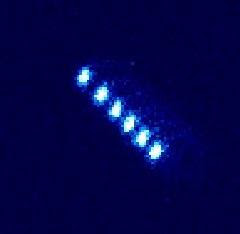Seeing the future of quantum systems allows for longer entanglement
by noreply@blogger.com (brian wang) from NextBigFuture.com on (#28X38)
Scientists at the University of Sydney have demonstrated the ability to "see" the future of quantum systems, and used that knowledge to preempt their demise, in a major achievement that could help bring the strange and powerful world of quantum technology closer to reality.
The applications of quantum-enabled technologies are compelling and already demonstrating significant impacts - especially in the realm of sensing and metrology. And the potential to build exceptionally powerful quantum computers using quantum bits, or qubits, is driving investment from the world's largest companies.
However a significant obstacle to building reliable quantum technologies has been the randomisation of quantum systems by their environments, or decoherence, which effectively destroys the useful quantum character.
The physicists have taken a technical quantum leap in addressing this, using techniques from big data to predict how quantum systems will change and then preventing the system's breakdown from occurring.

Trapped Ytterbium ions were used as one of the most advanced laboratory quantum systems for this study. Professor Biercuk's research laboratories are now located in the Sydney Nanoscience Hub, after six years as a visiting scientist at the National Measurement Institute. CREDIT University of Sydney.
Read more










The applications of quantum-enabled technologies are compelling and already demonstrating significant impacts - especially in the realm of sensing and metrology. And the potential to build exceptionally powerful quantum computers using quantum bits, or qubits, is driving investment from the world's largest companies.
However a significant obstacle to building reliable quantum technologies has been the randomisation of quantum systems by their environments, or decoherence, which effectively destroys the useful quantum character.
The physicists have taken a technical quantum leap in addressing this, using techniques from big data to predict how quantum systems will change and then preventing the system's breakdown from occurring.

Trapped Ytterbium ions were used as one of the most advanced laboratory quantum systems for this study. Professor Biercuk's research laboratories are now located in the Sydney Nanoscience Hub, after six years as a visiting scientist at the National Measurement Institute. CREDIT University of Sydney.
Read more